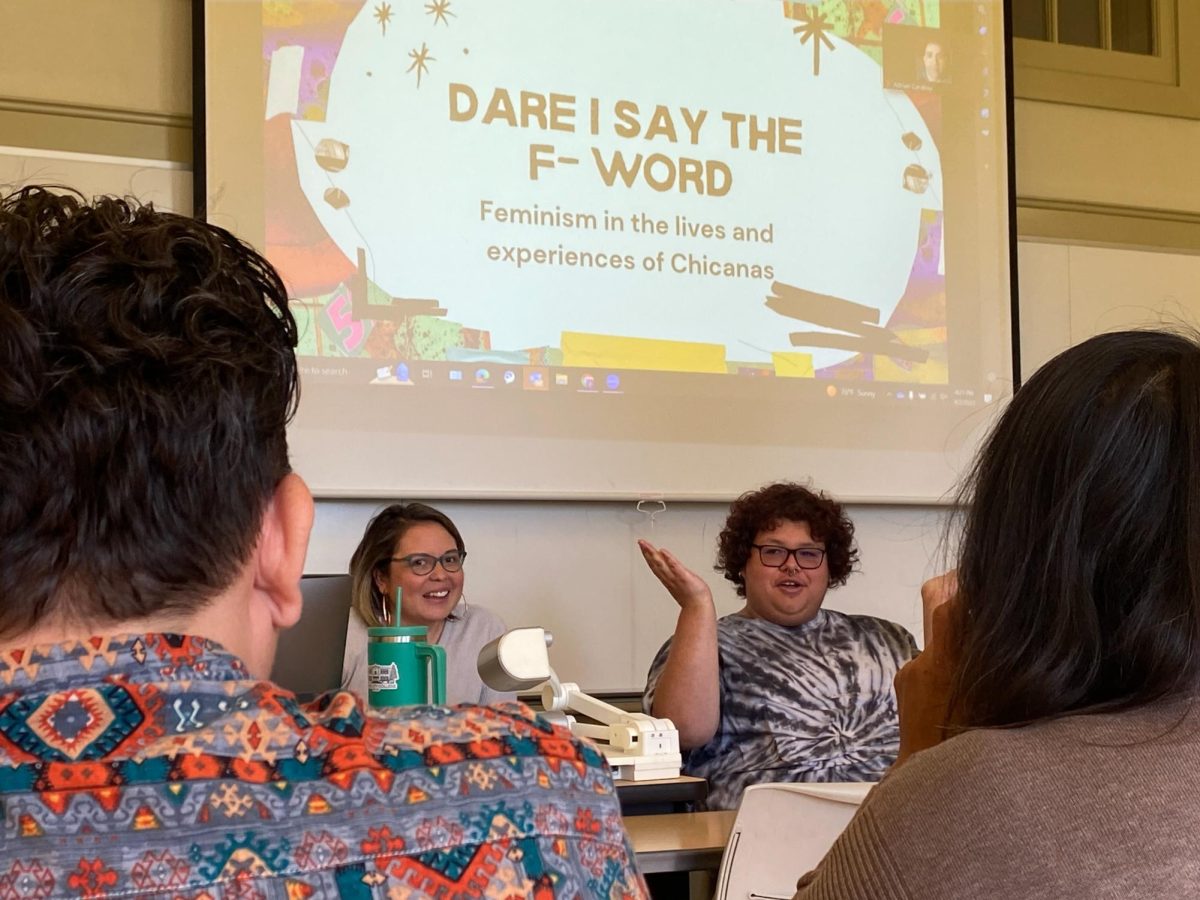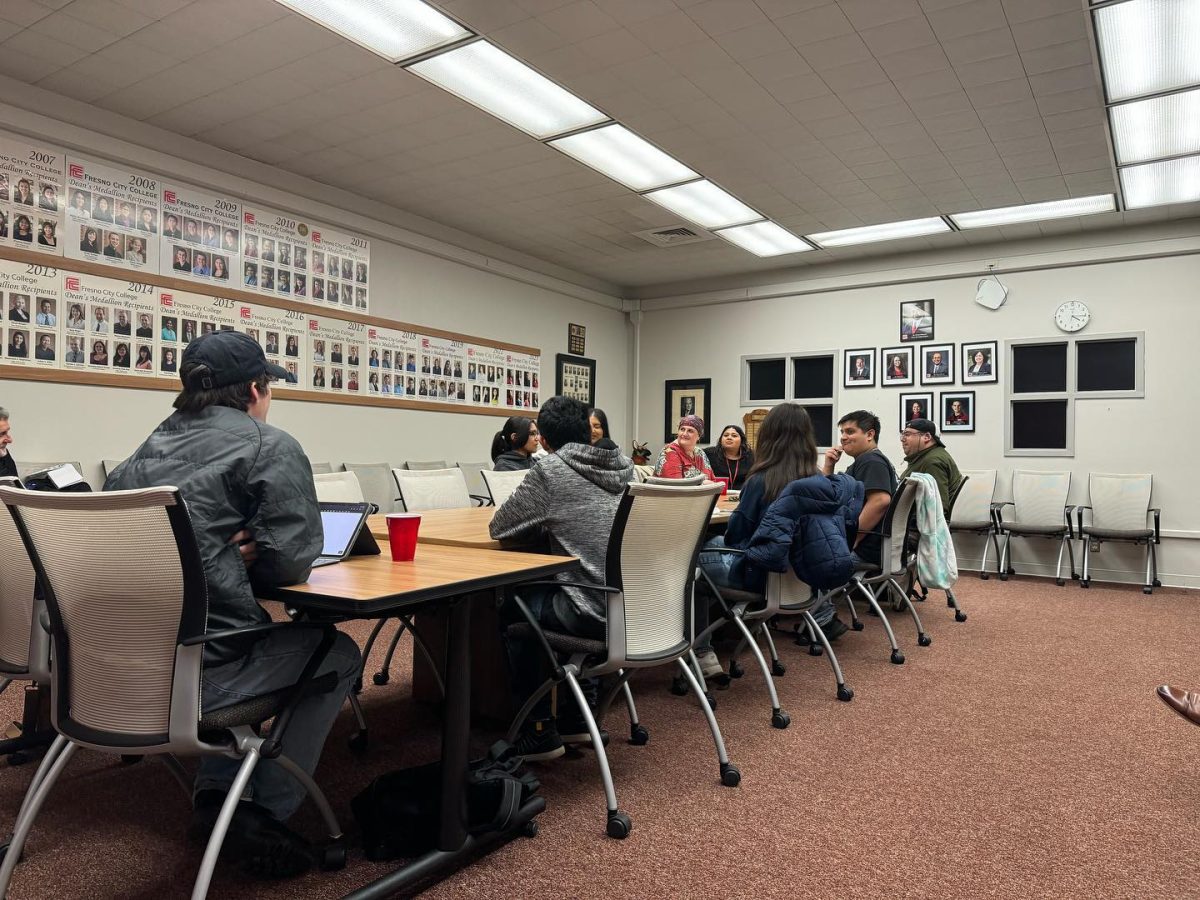When Jean Carroll walks into her English as a Second Language (ESL) class, she is greeted by pieces of chalk and chalk dust throughout the classroom. At the same time, her students walk in to a room that is littered with food remnants– coffee and soda containers from previous classes.
“The maintenance in our building is shocking. They expect us to teach in classrooms that are not cleaned,” said Carroll who teaches her ESL classes in the Language Arts building.
Carroll is concerned about the atmosphere of her classroom, but she is mostly worried about the technology equipment which is exposed to the dust in the room.
“The worst part is that the dust has accumulated near the smart boxes. There are holes around where the wire goes in, and the dust is around those holes, which means the technology is going to be affected,” said Carroll. “There is nothing to call the tech people about because nothing has happened to it yet, but it’s only a matter of time, and the worst part is that there will not be any money to replace it.”
Carroll reported the issue to her dean, who then reported it to the maintenance office. Then, Carroll received word that the college’s maintenance department is short staffed and is doing its best.
Carroll says the reason the maintenance office is short staffed is because the district had to fire some maintenance staff due to the 50 percent law, which requires that 50 percent of all funds be spent on instruction.
“The district runs close to the 50 percent margin but they can’t replace maintenance personal because they will not hire full-time faculty,” Carroll said. “I lay this at the door of the district, and their adherence to the 50 percent law.”
Outside of the Language Arts building, other instructors say they have faced some issues with maintenance, but that the issues were addressed quickly.
“Whenever I’ve complained about something, it gets taken care of within a reasonable amount of time,” said social science instructor, Allen Carden.
Janine Christl, Theater Arts instructor, said that last semester, the bathrooms near the Theater Arts buildings actually got pretty bad but were taken care of. And recently, a table near the box office had a lot of very offensive and vulgar graffiti on it. It was cleaned up, but has now been tagged once again.
Biology instructor, Scott Porteous, said the on-going maintenance is good enough. The few times he’s ever had any problems, he found the maintenance staff easy to work around and usually get to the problem pretty quickly.
Carroll worries that the Language Arts building may not be as prioritized like other buildings on campus.
“The showcases classes in the OAB [Old Administration Building] are not showing marker dust that thick. There are no chalkboards there,” said Carroll.
Even in certain language arts classrooms which have whiteboards, Carroll finds it hard to put a marker on the ledge because her hands end up black when she pick up the marker.
According to Brian Speece, Associate Vice Chancellor of Business and Operations for State Center Community College District, replacing equipments such as blackboards is funded through what is called the Decision Package, which requires each campus to allocate a portion of its lottery revenue to instructional materials.
Speece says the remodeling project hasn’t been as good in recent years because the state has not provided money for scheduled maintenance. “We have been doing as much as we can with our local money, but it’s less than what we used to get,” he said.
Now Speece said he hopes for another Measure E bond which had in 2002 provided money for remodeling. “We remodeled the Student Services building; we remodeled all the technical, industrial service buildings, but there are still a lot of classes that can use remodeling,” said Speece.
Janell Mendoza, Acting Vice President of Administrative Services, says most classrooms are maintained equally. However, certain areas of instruction such as science labs, child development lab school, art and home economics require a higher degree of maintenance due to the type of instruction that takes place in the room.
Speece explained that the maintenance department receives requests for issues that need to be addressed through a system known as maintenance service request. The office then prioritizes the issues depending on the severity of the health and safety concerns.
“Student health and safety is the No.1 priority,” said Speece. «If it›s long term things that aren›t safety related, they fill out a maintenance service request and we prioritize them based on health and safety. If it›s something that creates an unsafe condition, we don›t even ask for paperwork. We immediately follow up on the request.”
Darren Cousineau, director of Environmental Health and Safety, says there are less maintenance workers on campus than a year ago because of the tight budget but that all the high priority items are addressed.
“In particular, items that are deemed a health and safety issue receive top priority,” said Cousineau. “Some items that are desired by the campus are funded through the decision package, meaning there is a certain amount of money each campus gets to do projects based on how they prioritize the need for those projects.”
He adds that often times the reason some classrooms seem better equipped than others is because a particular division has made it a priority to make certain classes have certain features.
As for the chalk dust, Cousineau says it is not an occupational health and safety issue for employees.
“Chalk dust is calcium carbonated. It comes from limestone. The levels at which the dust is generated in the classroom due to chalkboard use doesn’t pose a significant safety hazard,” said Cousineau. “It’s a nuisance, but dry eraser boards create dust as well. But I can understand from a teacher’s perspective why they might want a white board.”
Speece said the district is currently working on a facilities master plan. “We are working on each campus to prioritize projects,” he said.
According to the Fresno City College Accreditation Self Study, the planning and prioritization of new facilities are handled through the college’s Facilities Committee with direction from the Strategic Planning Council and the college president. The facilities committee recommendations are then forwarded to the SPC and submitted to the president for approval.
The accreditation self study adds that while this has happened with certain projects, the implementation needs to be more consistent.
“Due to the budget crisis, the district is not filling classified positions that were recently vacated due to retirement,” said Janell Mendoza. “However, we are able to submit documentation for justifying vacancies that are critical to the operation of the college.”






